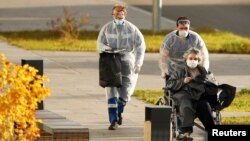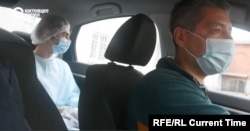Sergei Bespalov may never have imagined he would drive an ambulance, but, now, as Russia struggles with the logistics for responding to its growing coronavirus crisis, that is what this middle-aged man’s bright blue, four-person sedan has become.
Each morning, Bespalov calls into the Siberian city of Irkutsk’s polyclinic No. 15, confirms its need for volunteer drivers, and then drives to the clinic to pick up two masked paramedics.
“You drive up, the doctors come out,” he recounted. “They have a list of calls in their hands, and you just go to [the addresses for] these calls. On the way, you come up with a map for how to get there.”
A severe shortage of ambulances has prompted volunteers like Bespalov to turn their cars into emergency vehicles. Although Irkutsk, a city of nearly 617,500 people, officially has several hundred ambulances, when the local news site Irkutsk Segodnya (Irkutsk Today) called for an ambulance on October 17, it found that the dispatch center was still responding to calls from two to three days earlier.
Volunteer driver Bespalov handles only non-coronavirus cases, but he now responds to up to 30 calls in a single day. The polyclinic pays for his gasoline.
The Irkutsk region, which has nearly 23,400 registered cases of COVID-19, is not the only part of Russia experiencing ambulance shortages.
Some 4,500 kilometers to the west, in Perm, an industrial city of over 1 million people in the Urals, it can take 16 hours for an ambulance to respond to a call.
When paramedic Artyom Boriskin starts his shift at 8 a.m., he first responds to calls received at 4 p.m. the preceding day. And even then, a sick patient cannot be guaranteed a hospital bed.
Based on an unspoken rule, at least 50 percent of a person’s lungs must display lesions before he or she will be admitted into a Perm hospital, Boriskin claimed. Lines of 20 to 30 ambulances can be spotted at night outside of the city’s hospitals, waiting to deliver patients for a CT scan to determine the state of their lungs, Boriskin said.
Similar lines have also been reported in St. Petersburg, the country’s second largest city, five times the size of Perm.
Aside from a shortage of ambulances, Russia suffers from a “catastrophic deficit” of doctors and hospital beds -- particularly in the Perm region and the nearby regions of Kurgan and Sverdlovsk, asserted Dr. Anastasia Tarabrina, deputy chairwoman of the Alliance of Doctors, a non-governmental national medical union.
With 101, 393 active cases, though, Moscow, which has not reintroduced a lockdown, still tops the rankings for coronavirus infections. The number of new cases it experiences in a day – 5,224 between October 25 and October 26 – far surpasses the total active cases (3,724) of the entire Perm Krai, or region.
Nonetheless, no region is performing well with the pandemic, according to Tarabrina. “I wouldn’t say that in some regions the situation is better, given that it’s really bad everywhere,” she said.
In Kurgan, which currently has 1,109 active cases, all patients with high temperatures – a symptom of COVID-19 – usually must stay at home for a lack of medical professionals in hospitals, claimed Nadezhda Konopatskaya, the Alliance’s local representative. “They can’t wait four days for medical assistance,” she stressed.
It can take a week and a half before the results of a COVID-19 test are complete – a delay that frustrates contact tracing and also puts paramedics at risk, Konopatskaya noted.
The region’s health department told Current Time, however, that all infectious disease hospitals are adequately staffed with medical workers.
But the risks for these workers remain high. In the western Russian city of Oryol, paramedic Dmitry Seryogin reported that not a single ambulance from one six-ambulance substation responded to emergency calls on October 14 because too many paramedics were ill.
After Seryogin’s video of the substation spread online, the chief physician for Oryol’s emergency services, Vadim Kostyukov, confirmed the illnesses, but described them as “characteristic for any pandemic,” Orlovskiye Novosti (Oryol News) reported. He stressed that the population would not be left without medical care.
On October 26, presidential spokesman Dmitry Peskov conceded that Russia’s regions, particularly to the east of Moscow, are bearing the brunt of the pandemic. With well over 1.51 million cumulative cases, Russia currently ranks fourth in the world for pandemic impact, after the United States, Brazil, and India.
With an eye on the economy, President Vladimir Putin, however, has declined to reintroduce a lockdown.
Peskov commented that the “very difficult” situation demands that the national and regional governments make “energetic efforts” to ensure supplies of hospital beds, medicine, and personal protective equipment.
Health Minister Mikhail Murashko has estimated that 90 percent of the hospital beds available for COVID-19 patients are occupied, the Associated Press reported.
With the rate of infection still growing – 17,347 new cases between October 25 and October 26, TASS national reported -- some regional officials are converting maternity hospitals into coronavirus hospitals. Among other sites, locals have protested such conversions in Russia’s Chelyabinsk, Novosibirsk, Omsk, and Orenburg oblasts and in the Altai Krai, but, so far, without success.
In Zlatoust, a Urals town of some 173,000 people, officials justified the decision by stating that the facility’s oxygen supplies would be needed for ventilators for severely ill coronavirus patients.
Hospitals may be more plentiful in Moscow, the center of the country’s medical industry, but medical professionals in the Russian capital tell Current Time they still feel under pressure.
“We’re hammered again and we’re working as hard as we can,” commented Yekaterina Roshchina, a nurse at the city’s Filatovsky Hospital, a children’s hospital that has been adapted to handle COVID-19 cases. In the summer, Roshchina worked with 50 patients; now, that number has peaked at 69.
Ambulances from Moscow paramedic Dmitry Abidov’s substation hospitalize around 80 people per day, he said. With 60 ambulance stations overall in Moscow, that would work out to a hospitalization rate of about 4,800 people per day, but official data records only around 1,000.
“Maybe they’re not telling the truth,” Abidov said of Russian TV news, “because the load is very big.”
Abidov conducts express COVID-19 tests in his ambulance, but a severe case does not necessarily lead to instant hospitalization, he noted.
After Abidov calls the ambulance dispatcher, he may have to wait for hours before taking the patient to a hospital; an act that requires consultation with a physician.
"We warn the dispatchers that we’re waiting. And time goes by. They say to us, ‘Why are you sitting so long?’ And we say that we’re waiting for an answer [from the doctor], until the phone is answered,” Abidov recounted.
Waiting was Sergei Kravchenko’s first experience as a coronavirus patient. Despite daily calls to a coronavirus hotline, the resident of Shchyolkovo, a Moscow suburb, had to wait a week for a government-supplied doctor to attend to him.
Though the Moscow Department of Health has insisted that the city has a large supply of medicine used to treat COVID-19, some of the medication Kravchenko requires -- the antibiotic Levofloxacin, for instance -- has not been in pharmacies for days, he recounted.
Two other antibiotics commonly prescribed in Russia for treatment of COVID-19, Sumamed and Azitromitsin, also appear to be in short supply. Current Time correspondent Evgenia Kotlar could not find either in several Moscow pharmacies.
Pharmacies in both Moscow and the Siberian city of Yekaterinburg blamed the shortages both on heightened demand – people order multiple packets of the drugs – and also on a new monitoring system for ensuring the legality of the sold medicine.
Yet if Kravchenko opts to leave his home to search for the medicine he needs, no guarantee exists that any official body will respond.
Since his diagnosis early this month, no one from Rospotrebnadzor, the consumer-protection agency overseeing the government response to the pandemic, has checked on whether or not he remains in self-isolation, Kravchenko said last week.
“Perhaps, they’ve all already gotten used to this somehow and have stopped taking this seriously. I can’t say because the situation is, of course, strange.”









Facebook Forum